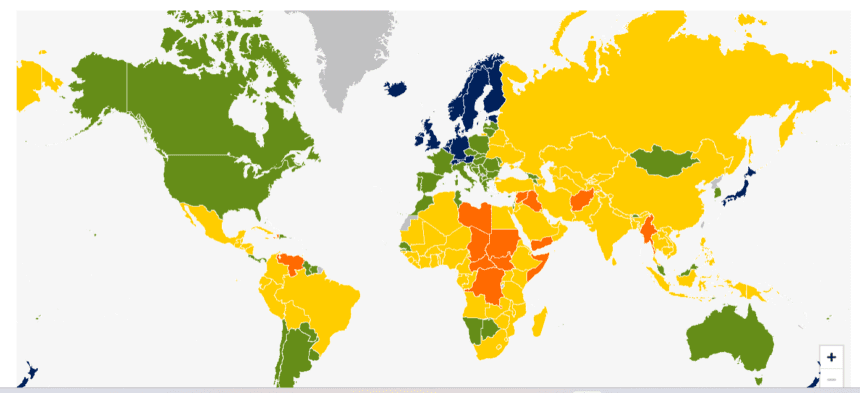Turkey has been ranked the worst performer in Europe in terms of impunity, according to the 2025 Atlas of Impunity, a global index published by the Eurasia Group. The index evaluates countries based on five dimensions: unaccountable governance, human rights abuses, economic exploitation, conflict and violence, and environmental degradation.
Globally, Turkey placed 35th, with a worsening record in democratic governance and the rule of law. The report highlights democratic backsliding and weakened checks on power as key factors contributing to the country’s position.
Turkey’s ranking places it closer to authoritarian-leaning states in Eurasia and the Middle East, rather than its European counterparts. The erosion of electoral integrity, media censorship, and systematic targeting of opposition figures and activists have intensified concerns about the country’s democratic decline.
“Turkey is the region’s worst performer by far and stands apart from the rest of Europe,” the report states.
While Nordic and Western European nations ranked among the most accountable, Eastern and Southeastern Europe scored comparatively higher in impunity—but none approached Turkey’s levels.
Governance and Human Rights Decline
Turkey’s governance score of 3.02, the lowest in Europe, reflects the dismantling of institutional checks and balances, suppression of opposition voices, and systemic restrictions on press freedom. In terms of human rights, Turkey ranks 27th globally, with ongoing reports of arbitrary arrests, prolonged detentions, and crackdowns on independent media.
The report also underscores growing executive control over the judiciary, where politically motivated prosecutions have become routine.
Despite opposition gains in the 2024 local elections, systemic barriers continue to obstruct meaningful political change.
A Decade of Democratic Erosion
Turkey’s democratic decline has been ongoing for more than a decade, accelerating with the government’s response to the 2013 Gezi Park protests. What began as a small demonstration against an urban development project in İstanbul quickly evolved into a nationwide movement against the increasing authoritarianism of the ruling Justice and Development Party (AKP). The government responded with a harsh crackdown, mass arrests, and restrictions on dissent, setting the stage for a broader erosion of democratic freedoms.
The 2016 failed coup attempt marked a turning point. In its aftermath, President Recep Tayyip Erdoğan’s government launched a sweeping purge, targeting political opponents, civil servants, academics, and journalists. Under emergency decrees, tens of thousands were arrested, media outlets were shut down, and civil society organizations faced unprecedented pressure.
A 2017 constitutional referendum abolished Turkey’s parliamentary system, granting sweeping executive powers to Erdoğan and eliminating key institutional checks and balances.
Since then, opposition figures—especially from the pro-Kurdish Peoples’ Equality and Democracy Party (DEM Party) and the Republican People’s Party (CHP)—have faced arrests, bans, and politically motivated legal cases. Judicial independence has further eroded, with courts being used to silence critics and suppress political dissent.
Although the 2023 elections were technically competitive, they took place in an environment heavily tilted in favor of the ruling party, with state resources, media control, and judicial bias overwhelmingly benefiting Erdoğan’s government. While the opposition secured local victories, the overall trend toward authoritarian rule remains firmly in place.
Turkey’s International Standing
Turkey was ranked 117th out of 142 countries in the World Justice Project’s Rule of Law Index, underscoring the continued deterioration of legal and democratic norms.



